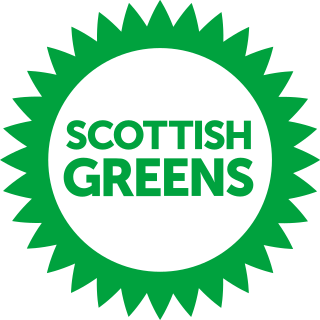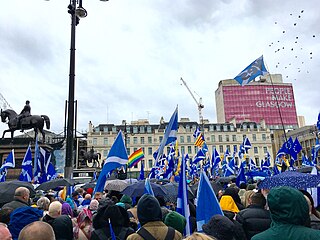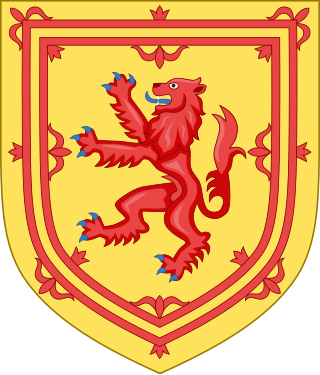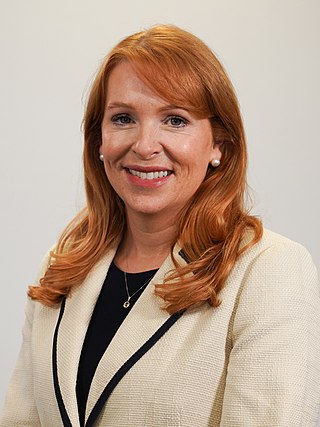The Scottish National Party is a social democratic political party in Scotland. The party holds 64 of the 129 seats in the Scottish Parliament and 44 out of the 59 Scottish seats in the House of Commons in Westminster It has 453 Local Councillors of 1,227.

The Scottish Greens are a green political party in Scotland. The party has seven MSPs in the Scottish Parliament as of May 2021. As of the 2022 local elections, the party sits on 13 of the 32 Scottish local councils, with a total of 35 councillors. They hold two ministerial posts in the Yousaf government following a power-sharing agreement with the SNP in August 2021, marking the first time Green party politicians will be in government in the UK.

Scottish independence is the notion of Scotland as a sovereign state, independent from the United Kingdom, and refers to the political movement that is campaigning to bring it about.
James Sillars is a Scottish politician and campaigner for Scottish independence. Sillars served as a Labour Party MP for South Ayrshire from 1970 to 1976. He founded and led the pro-Scottish Home Rule Scottish Labour Party in 1976, continuing as MP for South Ayrshire until he lost the seat in 1979.

Siol nan Gaidheal is a minor Scottish ultranationalist and ethnic nationalist group which describes itself as a "cultural and fraternal organisation".

The Scottish Constitutional Convention (SCC) was an association of Scottish political parties, churches and other civic groups, that developed a framework for Scottish devolution. It is credited as having paved the way for the establishment of the Scottish Parliament in 1999.

The Scottish devolution referendum of 1997 was a pre-legislative referendum held in Scotland on 11 September 1997 over whether there was support for the creation of a Scottish Parliament with devolved powers, and whether the Parliament should have tax-varying powers. The result was "Yes–Yes": a majority voted in favour of both proposals, and the Parliament was established following an election in 1999. Turnout for the referendum was 60.4%.

Unionism in Scotland is a political movement which favours the continuation of the political union between Scotland and the other countries of the United Kingdom, and hence is opposed to Scottish independence. Scotland is one of four countries of the United Kingdom which has its own devolved government and Scottish Parliament, as well as representation in the UK Parliament. There are many strands of political Unionism in Scotland, some of which have ties to Unionism and Loyalism in Northern Ireland. The two main political parties in the UK — the Conservatives support Scotland remaining part of the UK.

Patrick Harvie is a Scottish politician who has served as Minister for Zero Carbon Buildings, Active Travel and Tenants' Rights since 2021. He has served as one of two co-leaders of the Scottish Greens since 2008, and is one of the first Green politicians in the UK to serve as a government minister. Harvie has been a Member of the Scottish Parliament (MSP) for the Glasgow region since 2003.
The Scottish Liberal Democrats is a liberal, federalist political party in Scotland, a part of the United Kingdom Liberal Democrats. The party currently holds 4 of the 129 seats in the Scottish Parliament and 4 of the 59 Scottish seats in the House of Commons.

The Scottish Independence Convention(SIC) is a cross-party, non-partisan group with the aim of bringing together pro-independence parties, groups and organisations to promote the concept and ideals of an independent Scotland. The current conveners are Iain Black and Maggie Chapman (ex- co-convener of the Scottish Green Party).
In Scotland, the Scottish Socialist Party (SSP) is a left-wing political party. The party was formed in 1998 from an alliance of left-wing organisations in Scotland. In 1999, it saw its first MSP returned to Holyrood, with five more MSPs elected in 2003. It lost all MSPs in the 2007 elections and has lacked representation in the Scottish Parliament ever since.
Yes Scotland was the organisation representing the parties, organisations, and individuals campaigning for a Yes vote in the 2014 Scottish independence referendum. It was launched on 25 May 2012 and dissolved in late 2014 after Scotland voted against independence.
Better Together was the principal campaign for a No vote in the 2014 Scottish independence referendum, advocating Scotland continuing to be part of the United Kingdom. The organisation was formed in June 2012, operating until winning the vote on the referendum's polling day on 18 September 2014 with 2,001,926 (55.3%) voting against independence and 1,617,989 (44.7%) voting in favour. In June 2014, the campaign adopted a No Thanks branding, in relation to the referendum question.

Labour for Independence was a political organisation for Scottish Labour supporters that were in favour of Scottish independence. It claimed to have 2,000 members across Scotland in June 2014. The organisation had been described as an "SNP front" and, following the September 2014 independence referendum, its founder Allan Grogan joined the Scottish Socialist Party.

Women for Independence is a grass-roots political organisation which seeks to improve the representation of women in public and political life throughout Scotland. Founded in 2012, the movement promotes the causes of Scottish independence and other constitutional changes they consider likely to contribute to greater democracy, gender equality and social justice. The organisation's full name is Women for Independence – Independence for Women.

National Collective was a political organisation self-described as an "open and non-party [...] group of artists and creatives" who support Scottish independence active from 2011 to 2015. The organisation was founded in late 2011 by Ross Colquhoun, Andrew Redmond Barr and Rory Scothorne with the goal of "[helping to] shape the vision of a new society and nation". The group argued that independence for Scotland could achieve both a realisation of self-determination and a "cultural dawn" for the nation. The organisation was supported by independence-minded artists, including Liz Lochhead, Alasdair Gray, Elaine C. Smith and Karine Polwart.

The Scottish Socialist Party is a left-wing political party campaigning for the establishment of an independent socialist Scottish republic.

Ashten Regan is a Scottish politician who served as Minister for Community Safety from 2018 to 2022. A member of the Scottish National Party (SNP), she has been the Member of the Scottish Parliament (MSP) for Edinburgh Eastern since 2016. On 18 February 2023, Regan announced her candidacy for Leader of the SNP and First Minister of Scotland. She received 11.1% of the vote and finished in third place of three candidates.

A second referendum on independence from the United Kingdom (UK) has been proposed by the Scottish Government. An independence referendum was first held on 18 September 2014, with 55% voting "No" to independence. The Scottish Government stated in its white paper for independence that voting Yes was a "once in a generation opportunity to follow a different path, and choose a new and better direction for our nation". Following the "No" vote, the cross party Smith Commission proposed areas that could be devolved to the Scottish Parliament; this led to the passing of the Scotland Act 2016, formalising new devolved policy areas in time for the 2016 Scottish Parliament election campaign.












